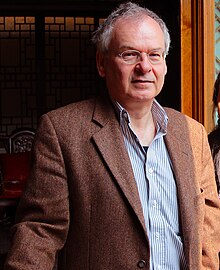Reinhard Febel
Reinhard Febel | |
|---|---|
 Febel visiting Gahoe-dong 31–79 in Seoul on 28 March 2012 | |
| Born | 3 July 1952 |
| Education |
|
| Occupations |
|
| Organizations | |
| Awards | |
Reinhard Febel (born 3 July 1952) is a German composer, notable for his operas. He is also a music theorist and a university professor at the
Mozarteum
.
Career
Febel was born in
Donaueschinger Musiktage.[2]
In 1989 he took over the Chair of Composition and Music Theory at the
Caspar Hauser) on a libretto by Lukas Hemleb was premiered at the Opernhaus Dortmund.[4] In 1996 WERGO recorded his Variations for Orchestra, Das Unendliche (The Infinite) for mezzo-soprano, baritone and orchestra, and his first string quartet, played by the Arditti Quartet.[5] Joseph Stevenson described Variations for Orchestra as "a highly individual, strikingly mysterious one-movement orchestral piece in a post-modern style that mixes tonality and atonality in a freely chromatic technique."[6] Das Unendliche on a poem by Giacomo Leopardi begins with an instrumental reference to the opera Euridice.[3] The string quartet shows elements of American Minimal music and is written in a notation of eight lines, two for each player.[7] In 2003 Wolkenstein, Lieder und Chöre nach Texten und Melodien des Oswald von Wolkenstein (Wolkenstein, songs and choruses after texts and tunes of Oswald von Wolkenstein) was first performed at the Berliner Philharmonie.[2] Triptychon is a "Kammermusiktheater für zwei Sänger, zwei Schauspieler und Kammerorchester nach drei Gemälden von Frida Kahlo, Edward Hopper und Diego Velázquez" (chamber music theater for two singers, two actors and chamber orchestra on three paintings by Frida Kahlo, Edward Hopper and Diego Velázquez) on a text by the composer. The three parts are entitled "Frida", "Gespensterhaus" (Ghost house) and "Raum 17" (Room 17). The opera was premiered in 2009 at the Opernhaus Kiel
.
Over the years he spent periods of study, teaching and composing abroad, including in South America (Chile, Peru, Uruguay, Argentina), New Zealand, South Africa (
Mozarteum University of Salzburg.[2]
Stage works
| Premiere | Title | Description | Libretto and source |
|---|---|---|---|
| 10 Nov 1983, Munich, Bayerische Staatsoper
|
Euridice | Chamber opera, 80' | Helmut Danninger, after Ottavio Rinuccini's libretto for Jacopo Peri |
| 15 May 1988, Opernhaus Kiel | Nacht mit Gästen | Music-theatre | the composer after the eponymous play by Peter Weiss |
| 12 Apr 1992, Opernhaus Dortmund | Sekunden und Jahre des Caspar Hauser | Opera in three acts and nine scenes | Lukas Hemleb |
| 6 Nov 1994, Staatstheater Darmstadt | Morels Erfindung | Opera in one act | Lukas Hemleb, after La invención de Morel by Adolfo Bioy Casares |
| 14 Sep 1996, Theater Hagen
|
Beauty | Music-theatre | Lukas Hemleb, after a newspaper article |
| 20 Dec 2005, WDR Köln | Desert Inn | Radio play | |
| 10 May 2001, Oper Bonn
|
Besuchszeit | Music-theatre for three actors and music, 60' | the composer |
| 22 Mar 2003, Philharmonie Berlin
|
Wolkenstein | Lieder after texts and melodies of Oswald von Wolkenstein | additional texts by the composer |
| 1 Aug 2005, Toihaus Salzburg / TRT Taschenopern-Festival | Frida | 20'. Ein Traumbild after Unos quantos piquetitos by Frida Kahlo | the composer |
| 1 Aug 2007, Toihaus Salzburg / TRT Taschenopern-Festival | Gespensterhaus | Kammermusiktheater, 30'. Ein Horrorbild after Haunted House by Edward Hopper | the composer |
| 16 May 2009, Opernhaus Kiel | Raum 17 | Music-theatre after the Rokeby Venus by Diego Velázquez | the composer |
Frida, Gespensterhaus and Raum 17 were presented as Triptychon, an operatic triptych based on paintings.[8]
Febel's works have been published by Ricordi.
Awards
- 1980 Beethoven Prize of Bonn
- 1984 Villa Massimo
- 1988 Johann-Wenzel-Stamitz-Preis
Publications
- Reinhard Febel: Musik für zwei Klaviere seit 1950 als Spiegel der Kompositionstechnik. Pfau Verlag, Saarbrücken 1998.
- Rainer Nonnemann (ed.) and Reinhard Febel: Alles ständig in Bewegung: Texte zur Musik 1976–2003. Pfau Verlag, Saarbrücken 2004.
Literature
- ISBN 3-9803090-4-5.
References
- ^ Rainer Nonnenmann (2011). "Reinhard Febel". munzinger.de. Retrieved 9 November 2011.
- ^ a b c d "Reinhard Febel". Ricordi. 2011. Retrieved 9 November 2011.
- ^ a b Joseph Stevenson (2011). "Das Unendliche, for mezzo-soprano, baritone & orchestra". AllMusic. Retrieved 14 November 2011.
- ^ "Febel, Reinhard". operone.de. Retrieved 13 November 2011.
- ^ "Variationen für Orchester / Das Unendliche / 1. Streichquartett". WERGO. 2011. Retrieved 14 November 2011.
- ^ Joseph Stevenson (2011). "Variations for Orchestra". AllMusic. Retrieved 14 November 2011.
- ^ Joseph Stevenson (2011). "String Quartet". AllMusic. Retrieved 14 November 2011.
- ^ Horst-Schinzel (3 May 2008). "Höhepunkte im Kieler Theater / Unbekannte Opern und Erinnerung an den Matrosenaufstand 1918" (in German). Horst-Schinzel. Retrieved 14 November 2011.
External links
- O.Univ.Prof. Reinhard Febel / Univ.Prof. für Komposition / 1. Stellvertreter Neue Musik / Abteilungsleiterstellvertreter Dirigieren/Komposition und Musiktheorie Mozarteum
- Reinhard Febel (German) Deutscher Musikrat
- Reinhard Febel mica
- Reinhard Febel at AllMusic
- Reinhard Febel (Composer, Arranger) bach-cantatas.com
- Biografie Reinhard Febel (German) SWR 2
